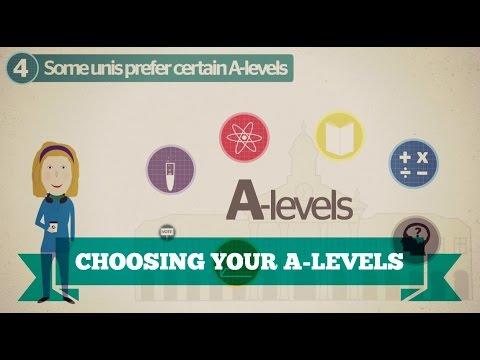A-level choices

Post-16 qualifications are completed over two years between the ages of 16 and 18. They include A-Levels and other qualifications. Some people may study them alongside GCSEs.
Instant Expert: Find all about post-16 learning choices from the National Careers Service.
Which A-levels are available?
There is a very wide range of subjects available to A-level students. Most schools and colleges offer standard subjects such as:
- Sciences
- Maths
- English
- Languages
If you want to study more unusual subjects, you may need to seek out a learning provider which offers them.
Instant Expert: A full comprehensive list of A-level subject can be found here on the AQA website.
Maths and English
If you have not gained your Maths or English at GCSE at level 4 or above, you will need to continue studying them alongside your post-16 qualifications or apprenticeship.
Crucial: You can also study for these level 2 qualifications at a Further Education College.
After A-Levels
A-levels are good way to get into university.
They can take you on to an apprenticeship, internship, higher education, or work. There are many options, which you can find more information about on the higher education page.
Choosing your A-Levels
Choosing your A-levels can be challenging. This video from Which looks at how other young people have approached the problem.
Things to consider when deciding
Possible degree subjects
If you have an idea of what you want to study at university, then it is a good idea to choose subjects that universities will want students to have for that university subject. For some subjects, it will not matter which A-Level you do. But others will need you to have specific A-levels, so it is a good idea to check university subject requirements just in case. You can find these on the UCAS website.
What job do you want?
You can study things that prepare you for a job directly, or you can keep your options open. Talk to your Information and Guidance Worker at your school or college, or visit the National Careers Service where you can also talk to advisors.
What do you enjoy?
Some people are motivated to work harder on subjects they enjoy. But most subjects become more interesting the more you study them. So many people choose to study things they are interested in, whether or not they enjoy them.
Subject combinations
This mostly depends on your preferences. You should think about the type of subjects you are choosing. Do you want a balance between the humanities and sciences? Or do you want your A-levels to be heavily based on one or the other?
Where to study
If your school offers them you can stay at your current school to complete your A-levels. You can also entirely change schools or go to a further education college. A list of Oxfordshire secondary schools can be found here.
Alternative options
If A-levels are not the best choice for you there are lots of other options such as an apprenticeship, traineeship, or BTEC level 3 qualifications. These options do not stop you progressing on to university. Find out about all your post-16 options.
Written by Jacob Starr, Work Experience student.



Leave a comment or question